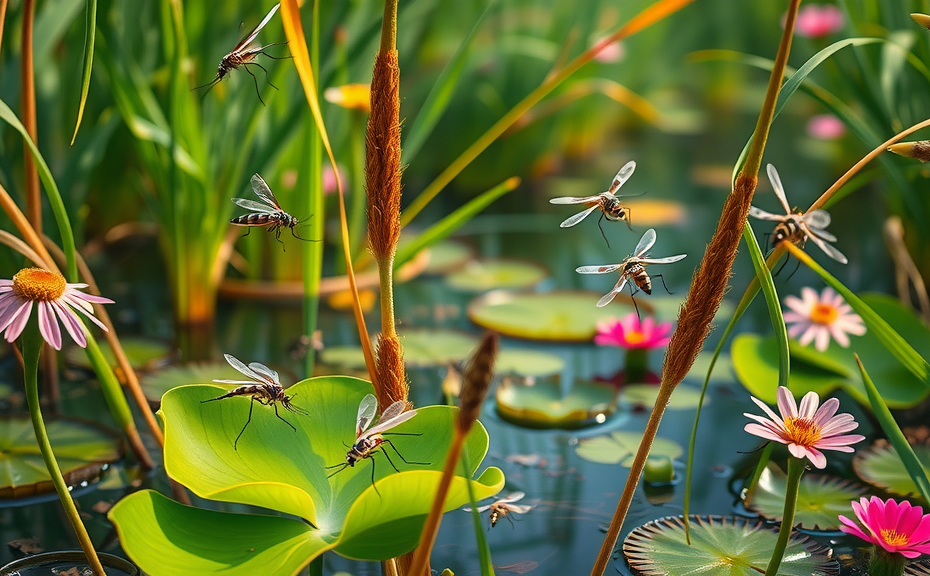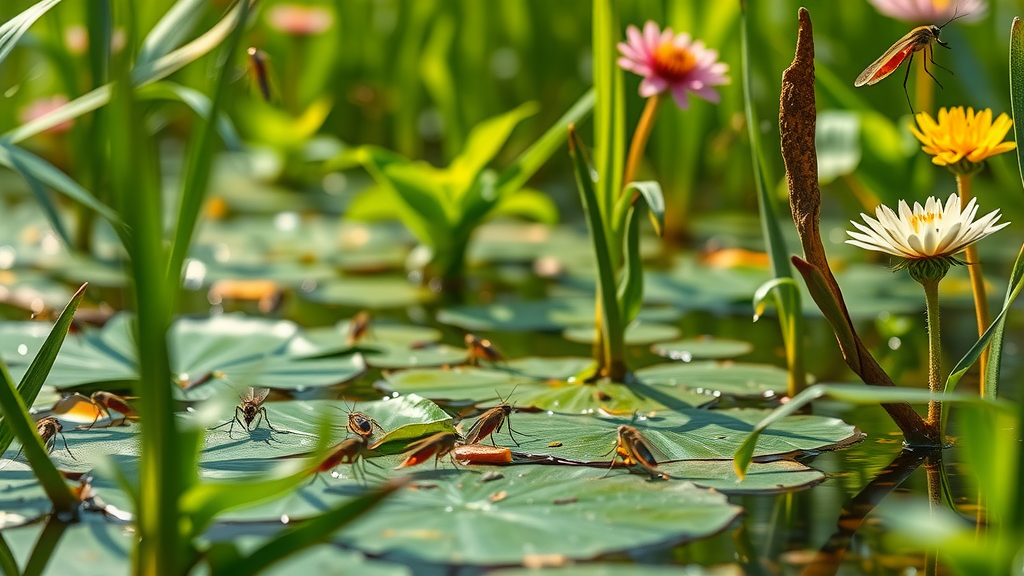These tiny insects are often overlooked, yet they play an intriguing role in sustaining ecosystem health. Serving as a significant food source for various predators within the food chain, they support populations of birds, bats, and amphibians.
The presence of mosquitoes contributes to ecological balance, fostering a rich diversity of wildlife.
Interestingly, several species engage in plant reproduction, acting as pollinators for specific flora, which enhances biodiversity in their habitats.
While commonly linked with disease transmission, their impact on ecosystems is complex and multifaceted, revealing how they can be more beneficial than many people assume.
Are Mosquitoes Beneficial As Pollinators
Often regarded primarily as nuisances, these insects contribute significantly to the ecosystem, particularly through their involvement in the pollination process. While much attention centers on their role as pests, male mosquitoes predominantly feed on nectar.
Some genetic studies suggest that numerous species exhibit effective pollination abilities across a range of plants, including orchids and various fruits.
This interaction enhances biodiversity, supporting numerous plant species and the wildlife dependent on them.
The larvae of these insects thrive in wetlands, playing a role as environmental indicators that contribute to nutrient cycling in aquatic ecosystems. This complex interplay underlines their importance in maintaining healthy habitats.
The Role Of Mosquitoes In Food Chains
Often regarded merely as nuisances, these insects play a pivotal role in maintaining ecological balance. The larvae thrive in aquatic environments, serving as a primary food source for fish and various arthropods.
This nutrient cycling not only supports these aquatic predators but also contributes to the overall health of their ecosystems.
Adult forms of these insects are integral to the diets of numerous bird species and bats, aligning them with essential food webs.
Notably, some species engage in ecosystem services such as pollination, particularly in wetland areas, which further underscores their significance. Their cycles influence predator populations, affecting biodiversity and stability within ecosystems.
Transitioning from their role in pollination, it is essential to consider how these insects impact ecological balance. The presence of mosquitoes helps sustain various predator populations, which in turn influences the abundance and diversity of other species within their habitat. Understanding these dynamics sheds light on the crucial roles that ecosystem services, pollination, arthropods, pheromones, mosquitoes, and nutrient cycling play in maintaining ecological balance.
| Ecological Role | Impact on Ecosystems |
|---|---|
| Larvae as a food source for fish | Supports aquatic predator populations |
| Adult insects in bird and bat diets | Contributes to food web stability |
| Pollination services in wetlands | Enhances plant reproduction and biodiversity |
How Do Mosquitoes Impact Ecological Balance
The presence of these insects plays an intriguing role in maintaining ecological stability. Serving as a wildlife food source, they are consumed by various animals such as birds, bats, and amphibians.
These species rely heavily on both adult mosquitoes and their larvae for nourishment.
Fascinatingly, some fish have adapted specifically to feed on mosquito larvae, contributing to biological control by naturally regulating their populations.
Male mosquitoes aid in pollination, potentially impacting up to 300 plant species through fertilization. A decline in mosquito populations could disrupt food chains, leading to significant consequences for species dependent on them.
This delicate balance emphasizes the interconnectedness of flora and fauna within these ecosystems.
Understand Disease Transmission Through Mosquitoes
Mosquitoes serve as intricate conduits for the transmission of numerous pathogens. These vectors acquire infectious agents while feeding on the blood of hosts harboring various diseases.
Upon entry into the mosquito’s body, the pathogens undergo processes that enable their replication.
For instance, the malaria parasite initially develops in the mosquito’s gut before migrating to the salivary glands.
During the subsequent feeding process, mosquitoes inject saliva laden with these pathogens into new hosts. Habitat fragmentation can significantly alter ecosystem dynamics, influencing mosquito populations and the propagation of mosquito-borne diseases.
Effective pest management strategies are critical to curtailing outbreaks and safeguarding public health.
Mosquitoes and Disease Transmission
- Mosquitoes are responsible for transmitting diseases such as malaria, dengue fever, and Zika virus.
- Over 700 million people are affected by mosquito-borne diseases each year, leading to significant health crises.
- Habitat fragmentation can increase mosquito breeding sites, thereby elevating the risk of disease outbreaks.
- Effective pest management strategies can reduce mosquito populations by up to 80%, helping to control disease spread.
The Importance Of Biodiversity Including Mosquitoes
The role of certain insects in various ecosystems can often be underestimated, yet they contribute significantly to ecological balance. Mosquitoes serve as a key food source for numerous insectivorous animals, including birds, bats, and amphibians, which depend on them during different stages of their life cycle for nourishment.
This interdependence fosters rich biodiversity, as these species rely heavily on mosquitoes as natural pest controllers.
The lesser-known aspect of mosquitoes includes their contribution to pollination for various plants, offering agricultural benefits that may often go unnoticed.
These insects engage in complex interactions within ecosystems, illustrating the interconnectedness of wildlife and the environment. Such dynamics underscore the importance of these creatures in ecological research and highlight the need for conservation efforts.
Recognizing this intricate web of life can inform strategies to protect species and their habitats, setting the foundation for sustainable practices in managing ecosystems.
Mosquitoes And Aquatic Ecosystems Relationships
These small creatures contribute significantly to their ecosystems, acting as both larvae and adults across diverse environments. Mosquito larvae demonstrate remarkable adaptability, thriving in unconventional habitats such as tree holes and ephemeral pools.
Their presence is integral to species interaction, as the larvae consume organic matter, promoting nutrient cycling which enhances overall environmental health.
Adult mosquitoes, often recognized for their blood-feeding tendencies, also play a role in pollination, supporting the reproduction of various flowering plants.
This biological significance underscores their contribution to maintaining diverse habitats, emphasizing the importance of sustainable practices in habitat restoration. Understanding these connections can help promote a balanced ecosystem, leading to effective population control and improved biodiversity.
Mosquitoes and Ecosystems
- Mosquito larvae can thrive in diverse and unconventional habitats, such as tree holes and ephemeral pools.
- Larvae contribute to nutrient cycling by consuming organic matter, which enhances environmental health.
- Adult mosquitoes play a role in pollination, aiding the reproduction of various flowering plants.
- Understanding the ecological roles of mosquitoes can promote balanced ecosystems and improve biodiversity.
Can Mosquitoes Be Natural Pest Controllers
While often perceived purely as nuisances, these insects can have an unexpected impact on maintaining balance within their environments. Within aquatic habitats, certain larvae actively prey on a variety of other insect larvae, contributing to ecosystem resilience.
This predatory behavior aids in regulating pest populations, which is vital for local biodiversity.
Interestingly, not all species are known to transmit diseases; some actually support insect diversity by promoting balance in their ecosystems.
Research indicates that introducing specific mosquito species in controlled environments can effectively reduce populations of harmful pests, pointing to their potential roles in sustainable pest management strategies. This phenomenon highlights the complex interactions within vector ecology and how these insects may lead to beneficial outcomes in natural resource management.
Exploring The Life Cycle Of Mosquitoes
The fascinating transformation of these insects showcases their adaptability within various ecosystems. Mosquitoes experience four distinct life stages: egg, larva, pupa, and adult, each contributing to food webs and ecological balance.
Eggs are usually deposited in stagnant water sources, where they develop into larvae. These early-stage mosquitoes are aquatic organisms, filtering microorganisms from their environment and playing a significant role in nutrient recycling within their habitats.
As they grow, they undergo several molts before entering the pupal stage, during which they undergo metamorphosis.
Following this transformation, adult mosquitoes emerge, further influencing agricultural ecology through their involvement in pollination activities. The life cycle details highlight their various ecological niches and underscore their importance in maintaining balanced ecosystems.
Mosquito Life Cycle and Ecology
- Mosquitoes undergo four life stages: egg, larva, pupa, and adult, each playing a crucial role in their ecosystem.
- Larvae are aquatic and filter microorganisms, contributing to nutrient recycling in stagnant water habitats.
- The pupal stage involves metamorphosis, leading to the emergence of adult mosquitoes.
- Adult mosquitoes participate in pollination, influencing agricultural ecology and supporting biodiversity.

